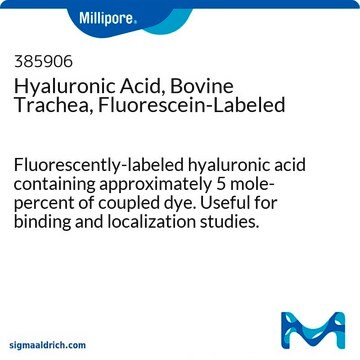F1177
Fluorescein hyaluronic acid
>95%, powder
Synonym(s):
Hyaluronic Acid Fluorescein Conjugate
Sign Into View Organizational & Contract Pricing
All Photos(1)
About This Item
Recommended Products
Assay
>95%
form
powder
mol wt
~800,000 Da
color
orange
solubility
H2O: soluble 1 mg/mL
storage temp.
2-8°C
Related Categories
Application
Fluorescein hyaluronic acid has been used in the fluorescence imaging of hyaluronic acid (HA) and dextran surface coated filmsand patterned surfaces. It has also been used in confocal fluorescence microscopy to localize hyaluronic acid in collagen/HA composite gels .
Biochem/physiol Actions
Hyaluronan macromolecules (HAs) coupled to fluorescein amine is exploited to screen the hyaluronidase activity using fluorescence correlation spectroscopy (FCS) by measuring the quenching of fluorescein-labeled HA fragments. It binds on cell surface of malignant mesothelioma derived from human tumors.
Used to bind on cell surface of malignant mesothelioma derived from human tumors.
Other Notes
From cock′s comb or by fermentation.
Storage Class Code
11 - Combustible Solids
WGK
WGK 3
Flash Point(F)
Not applicable
Flash Point(C)
Not applicable
Personal Protective Equipment
dust mask type N95 (US), Eyeshields, Gloves
Certificates of Analysis (COA)
Search for Certificates of Analysis (COA) by entering the products Lot/Batch Number. Lot and Batch Numbers can be found on a product’s label following the words ‘Lot’ or ‘Batch’.
Already Own This Product?
Find documentation for the products that you have recently purchased in the Document Library.
Customers Also Viewed
Hyaluronan receptors are expressed on human malignant mesothelioma cells but not on normal mesothelial cells
Asplund T and Heldin P
Cancer research, 54(16), 4516-4523 (1994)
T Asplund et al.
Cancer research, 54(16), 4516-4523 (1994-08-15)
Hyaluronan-binding sites were demonstrated on the cell surface of three malignant mesothelioma cell lines derived from human tumors using either [3H]hyaluronan or fluorescein-tagged hyaluronan. No hyaluronan-binding activity was observed on normal human mesothelial cells. The absence of hyaluronan receptors on
Rafal Fudala et al.
Journal of photochemistry and photobiology. B, Biology, 106, 69-73 (2011-11-16)
In this report we propose a lifetime-based sensing (LBS) for the detection of hyaluronidase (HA-ase). First, we heavily label hyaluronan macromolecules (HAs) with fluorescein amine. The fluorescein labeled HA (HA-Fl) has a weak fluorescence and short fluorescence lifetime due to
Human macrophage adhesion on polysaccharide patterned surfaces
Tsai IY, et al.
Soft Matter, 7(7), 3599-3606 (2011)
Hyaluronan and dextran modified tubes resist cellular activation with blood contact
Eckmann DM, et al.
Colloids and Surfaces. B, Biointerfaces, 108, 44-51 (2013)
Our team of scientists has experience in all areas of research including Life Science, Material Science, Chemical Synthesis, Chromatography, Analytical and many others.
Contact Technical Service









